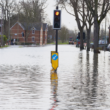INSIDE WASHINGTON/Rethinking readiness
State and local leaders are pushing back against suggestions that the federal government be put in charge of disaster relief efforts, saying they are best equipped to handle catastrophes that strike their communities. Some state officials acknowledge more must be done on their level to ensure that residents’ needs are adequately addressed following a tragic event. But those same leaders also are urging the federal government to reassess its plans to help states, cities and counties prepare for and respond to disasters.
Governors, mayors and county commissioners are asking federal lawmakers to consider reviewing the Federal Emergency Management Agency’s mission. “Rather than assuming everything should be done at the federal level, our nation is much better off holding localities to higher expectations and improving FEMA,” says Florida Gov. Jeb Bush. “Taking away Florida’s ability to respond takes away our passion for creativity and service that makes us good first responders. Before Congress considers a larger, direct federal role, it needs to strengthen areas within FEMA and hold communities and states accountable for properly preparing for the inevitable storms to come.”
Homeland Security Secretary Michael Chertoff acknowledges that FEMA’s mission needs to be reviewed. “There are many things that did not work well with the response [to Hurricane Katrina],” Chertoff says.
State and local officials in Louisiana also have been panned by critics for their actions following Katrina. Congress and the White House have launched investigations into the federal, state and local governments’ response to the storm.
Beaumont, Texas, Councilmember Audwin Samuel says the most effective way to prepare for future catastrophes is to “develop a comprehensive national homeland security and disaster preparedness strategy, because the likelihood of natural disasters and the potential for hazardous or radioactive material spills, pipeline accidents, large scale social disorders, and domestic and international terrorism require that all levels of government coordinate efforts to protect communities.”
Rep. Peter King, R-N.Y., agrees that state and local leaders and first responders are better equipped to understand the needs of their residents once a disaster strikes. Still, King, who serves as chairman of the U.S. House Homeland Security Committee, says that is dependent upon “a competent and functioning local and state response infrastructure.”
“I have agreed publicly with President Bush that the Congress must begin a serious dialogue on the question of whether the president and the federal government should be given greater authority to intercede into local affairs without request when — for whatever reason — the state and local response infrastructure is unable to perform as required under the circumstances,” King says. “It may indeed be necessary to do so, if for no other reason to ensure that accountability and authority are more closely aligned.”
With Congress trying to finish its work for the year, it is highly unlikely official action on the subject will occur in the next 60 days. However, the issue of emergency response is expected to be a major issue once Congress returns to Capitol Hill in January.
The author is Washington correspondent for American City & County.



















